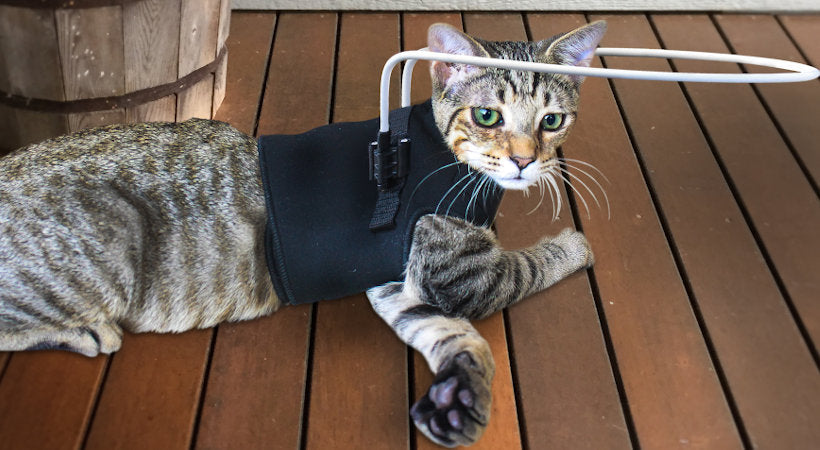Beagle Lifespan: How Long Do Beagles Live? (Life Expectancy)

Living By New Rules: Caring for a Blind Cat
Living with disabilities can be challenging and demanding. Just like humans, cats can be born blind or may develop blindness at some point in their lives. Vision loss can be frustrating, but cats, as independent animals, with a little adjustment, can continue to lead a fulfilling and happy life. All they need is a bit of love and support from your side.
Reasons for Feline Blindness

Unlike dogs, which are primarily focused on their sense of smell, cats rely on all three senses equally. Although cats are known for their excellent eyesight, feline vision loss is not uncommon. Blindness most commonly occurs in older cats and is a consequence of the onset of aging cataracts.
Kittens can be born blind, but more often cats experience gradual loss of vision. The most common causes are diseases such as diabetes, glaucoma, tumors or physical trauma. Even losing sight in only one eye can have a devastating impact on a cat.
Help a Blind Cat Adjust to Vision Loss
In cases of feline blindness, the loss of night vision or vision in low light conditions are one of the first symptoms. In cats that develop blindness, it is not uncommon for declines to occur when jumping on home furniture. You may notice that their irises do not respond to when a strong light source is drawn into them. To help you overcome this stressful situation, take a look at some tips below:
1. Give Them Time to Adjust
Cats are very independent animals so, you will require patience as you support them. With time they will adapt to their new lifestyle. If vision loss is gradual, the transition is much easier for any cat. And by the time your cat completely loses their eyesight, they will easily navigate in their environment. However, if vision loss occurs suddenly, much more time will be needed for adaptation. If this is the situation, try to stay calm and cool - because pet handicaps can be overwhelming for the owners even more then for their pets.
2. Let them Make New Mental Maps

Be sure not to change your home significantly, as any new furniture can be a source of danger to your pet. Especially if your cat tends to jump or climb. The blind cat will need to create a new, internal "map" of its environment. Getting to know parts of the home in a completely different way than when their eyesight functioned normally. It is best to designate their toilet or litter box as a reference point. Bring your cat to the litter box and then let them explore the house from there. It will help that your cat can always find the toilet wherever they are. Make this a part of your daily morning routine.
For starters, you can place the litter box in a smaller room. As the cat learns how to safely move in that room, you can let open new rooms in other parts of the house for them to map out. Place small pieces of their favorite treats along the path that will take them to the food bowl is also one of the options that will make it easier for them to learn different rooms.
Tip: Wearing a Blind Halo can help your cat navigate the house safely on their own. While Walkin' Pets no longer sells its own Blind Dog Halo, we continue to support the blind pet community by recommending Muffin’s Halo a well-respected product designed to help visually impaired dogs move around with ease.
3. Keep Your Cat Engaged
Changes in your cat's eyesight does not mean your cat's behavior changes. Blind cats still want to run, engage and play. Playtime is especially important for blind cats who enjoy it just as much as other cat. There can be found plenty of noisy toys like balls containing bells that stimulate their hearing and smell senses. Also, remember to block access to potentially hazardous items and parts of the apartment like stairs, toilet, curtains, patio, etc. Take care of them and they will take care of you too.
4. Say Hello and Cuddle

Blind cats startle easily and can be especially sensitive to sudden sounds. Sounds such as unlocking and opening doors can be especially jarring because the sounds are unexpected.
Greet your cat every time you enter the house or room and gently touch it on the back or neck. Letting them know it's you and not to be scared. Some cats may still see light, in that case turning on a light when you come into the room can help as well.
5. Talk, Talk, Talk…
We all love attention and nice words. And blind cats - especially. Make sure you talk to them as much as possible so that the color of your voice adds security and helps them create a new mental map of space. Also, when away from home, leave your TV or radio on - the sounds they emit will help them better orient themselves in the home.
Can Cats Get Cataracts?
Cats can develop cataracts, the Himalayan, Birmans and British Short Hair cats are genetically prone to cataracts, but they can occur in any feline breed. Feline cataracts can develop at any age and any gender cat.
A cat's cataracts can develop for many different medical reasons, and past damage to the lens may cause cataracts to develop as well. Cataract development can usually be spotting fairly quickly during a routine Vet visit. If not caught right away, cats with more advanced cataracts will have a haziness develop in front of their lens.
Article Courtesy of True Pet Story.
Related Articles:








